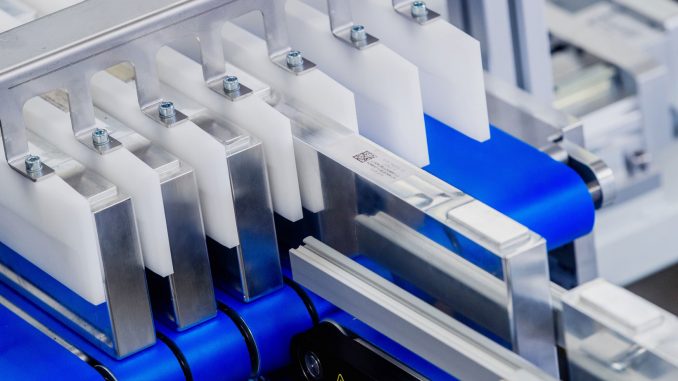
The demand for electric vehicle batteries is booming, and 2021 will set the ground for battery mass production worldwide. Till 2028 a total of about 66 gigafactories are planned. These future manufacturing sites are claimed to add more than 2018 Gigawatt hours (GWh) of total capacity per year. Turn-key automation solutions will be critical success factors for this fast-growing industry.
It is a fact, that lower emissions policies and other factors drive a global transition towards electric vehicles. While 2020 the share of electric car production is around three percent, it’s multiplying to 10 percent in 2025 and up to nearly 30 percent in 2030. By 2040, electric vehicles could make up the majority of new car sales worldwide, and as the automotive industry resets, battery production is at the center of attention.
Large scale and Start-up battery cell manufacturers already started their production at newly established production sites, but also at existing factory structures. Green, lean and efficient production processes are crucial to reduce costs and develop batteries with maximized capacities. This trend is a result of consumer demand for longer ranges in this fast-growing market.
In January 2021, the European Commission approved 2.9 billion Euros to support research and innovation in the battery value chain with 42 participating companies of all sizes. Several examples of cross-border battery cell consortiums involving NorthVolt in Sweden, VARTA in Germany, SAFT in France, and TESLA in Germany breaking ground at an enormous speed, to name only a few. Asian corporates like CATL, LG, or Panasonic also announced to scale-up capacity in Europe even without or only limited funding support, referring to Bloomberg.
FlexLink provides turn-key solutions for battery production automation
FlexLink helps several battery producers develop these state-of-the-art automation processes to support the factories on their mission. The objective is to design and establish turn-key solutions. For example, to automate the jelly-roll process for battery cell assembly. This assembly is an advanced operation that puts extremely high demands on the production facilities. Due to its sensitivity to contamination, it takes place in cleanrooms. Special provisions reduce particle contamination and control other environmental parameters such as temperature, humidity, and pressure.
Cleanrooms are classified by how clean the air is, including low humidity rates. FlexLink’s automated solutions, e.g. the jelly roll process, have been qualified according to the environmental conditions of ISO 6 and ISO 7 cleanroom conditions with a very low humidity level. “Our concept leverages scaling, vertical integration, automated manufacturing, and handling of cross-functional designs and processes. Together with our customers, the FlexLink team has truly pushed the boundaries for battery production automation”, says Fabrizio Battista, Global Key Account Manager Automotive at FlexLink.
Would you like to know more about cleanroom technology and automated process solutions for battery production? You are always welcome to contact us or visit our website. To never miss out on any of our blog posts, keep an eye out on this blog and follow us on LinkedIn or Twitter. We will continue to share our knowledge in industrial automation and production efficiency with you.


Leave a Reply